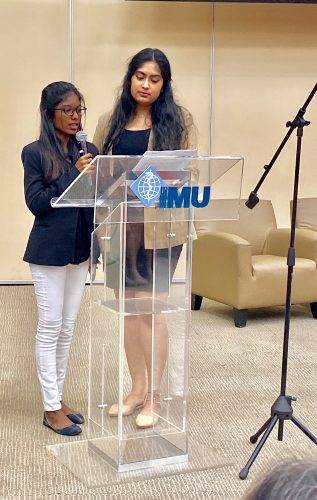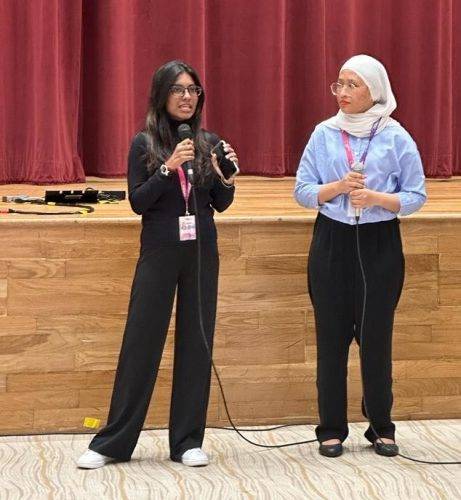It was a delightful afternoon spent, talking about one of the most relevant topics to date – mental health with our Psychology alumna, Daarshini Ramesh and we agreed off the bat that mental health is one of the most important subject matters in the current context and is rapidly gaining recognition and attention worldwide. There has been a growing understanding of mental health issues thanks to efforts by advocacy groups, mental health professionals, and individuals. As they share their experiences, it has helped reduce stigma and promote open conversations about mental health well-being. This increasing awareness makes it easier for individuals to seek support without fear of judgement.

Daarshini’s long-time interest in Psychology has always centered on human reactions. As we can imagine, these reactions are complex and can vary significantly based on individual differences, cultural factors, past experiences, and the specific context of the situation. While initially she thought medicine would be her future, she has zero regrets standing firm on her decision to pursue psychology and is happy to share that she had a memorable time in IMU. She reflected fondly on her student days and credits inspiring lecturers and supportive friends for making her IMU days enjoyable.
The trajectory of her days after IMU was altered by her internship during the final semester. After a taste of office-based job, Daarshini decided that it was not suited for her. At the conclusion of her degree programme, Daarshini dove straight into the working world and found that opportunities for a career handling behavioral issues in children came up most often in job searches.
As one who never thought of herself with the disposition to work closely with children, Daarshini soon made the wonderful discovery that not only did she enjoy her work, she also naturally excelled at it. This was especially evident in the clarity and conviction of her description of her job while being a therapist at SEED Autism Services.
Her ability to break down and share the nature of her job, providing therapeutic support and interventions to children with autism spectrum disorders was nothing short of inspiring and heartwarming. Daarshini also explained that while she had little to no experience being a therapist, she was able to learn so much on the job as she went along and holds the time she spent as a therapist in high regard.

Our conversation with Daarshini took a more interesting turn when we got discussing the reason behind the rapid rise of triggered mental state, anxiety, and depression. Through the lens of a trainee clinical psychologist, Daarshini observed that when Covid-19 was rampant and the whole world stood still and isolated for safety, mental health issues rocketed and remained at an all time high. The stress of being cut off from loved ones, the abrupt change in lifestyle, losing loved ones and economic downturn took a toll on most of us and has proven to cause long term psychological impact. Coupled with the fervent rise of social media, the psychological impact of the issues we listed above becomes much more severe.
Rise in Depression Among Millennials and Generation Z
We continued chatting about the obvious rise of depression among millennials and generation Z especially, stems from a multitude of factors among which is mainly stress of ever-increasing cost of living and not being able to live up to societal expectations. These main stressors almost always lead to feelings of inadequacies. We concurred that so many things in life these days are measured to how appealing it would look on social media and is damaging on so many levels and causes unnecessary problems in our already challenging lives.
We even had the opportunity to skirt around the topic of how parenting styles have an impact on the kind of person you grow up to be whether it be positive or negative. This topic clearly warranted a whole different and longer conversation, so we did our best to limit our discussion to matters on the surface. Daarshini like many other mental health professionals agree that some psychological issues that manifest in some adults could be traced to childhood experiences. Some of our emotional and physical responses are closely linked to how we were brought up, things we were exposed to, even observation of how our parents and those closest around us behaved and responded to situations.
She elaborated further that many studies have been done and are available for our consumption, highlighting how parenting styles have profound effects on a child. There are four typical parenting styles which have been identified by researchers being authoritarian, authoritative, permissive, and uninvolved or neglectful parenting. Each parenting style has its own unique effects on children which can last well into adulthood.
With Daarshini’s emphasis on how a childhood riddled with negative factors can give rise to behavioral and emotional problems later in adulthood, we concluded in agreement that we should work towards being more conscious of our behavior and words especially around tender aged persons as they tend to do as we do, not as we say.
As our conversation came to an end, we mused on how ideally mental health services should be made more accessible to everyone and how going to see a mental health professional shouldn’t be a sign of someone having problems or issues but rather as an act of self-care like a facial or spa day.
Among many gems Daarshini shared with us during the conversation one sage advice she gave truly stuck – building mental resilience to face life in general can be done simply by helping someone else through difficult times. As you listen to the problems and difficulties the other person is facing, you inadvertently put yourself in their shoes to give appropriate advice and suggestions on how to navigate through it. There is wisdom in seeking help and giving help. Daarshini then encourages us to have compassion for ourselves when things don’t go accordingly and do not hold back on showing gratitude to people around us and of course to ourselves as well.
We admire and appreciate Daarshini’s passion for her dedication in her profession and eagerly await to celebrate her success of completing her Master of Clinical Psychology.









